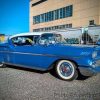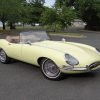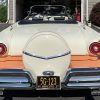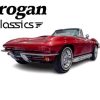1922 Hispano-Suiza H6B Six-Passenger Tourer Hispano Suiza
Description
This 1922 Hispano-Suiza H6B is said to have been delivered new with Million-Guiet open tourer coachwork in August 1922 to Garages Parisiens in France before making its way to England, and it was reportedly discovered in the 1960s after a barn collapse damaged its body. Chassis 10439 was owned by a New Hampshire collector in the 1970s, and was later fitted with replacement six-passenger tourer coachwork after being sold to its next owner in 2000. In 2012 the car was sold in a partially refurbished state to its current owner, who commissioned the completion of the project over the ensuing 10 years before displaying it in their private museum. Finished in two-tone blue with maroon accents, the car is powered by a 6,597cc monobloc inline-six that features a single overhead camshaft, a billet crankshaft, twin-plug ignition, and a single updraft carburetor. Additional features include a three-speed manual transmission, mechanically actuated four-wheel drum brakes with servo assistance, maroon-painted 20” wire wheels, a side-mount spare, a dark blue convertible top, beige and blue cloth upholstery, and fold-out jump seats. This H6B tourer is now offered on dealer consignment in San Diego, California, with photos and invoices from the refurbishment, a tool kit, and a clean Texas title. Hispano-Suiza was founded in 1904 in Barcelona, Spain, and produced motorcars under the direction of Swiss co-founder and chief engineer Marc Birkigt before shifting its resources to aircraft propulsion during World War I. Elements of Birkigt’s aeronautical engine design were carried over into Hispano-Suiza’s return to automobile manufacturing with the 1919 introduction of the H6, which was succeeded in 1922 by the higher-powered H6B variant. Rolling chassis were manufactured near Paris, France, before being outfitted with bodywork from the buyer’s coachbuilder of choice. This example is said to have begun its life with Million-Guiet six-passenger tourer coachwork and is believed to have been fitted with its current four-door open tourer body circa 2000. The body was repainted in its current shade of pale blue with bright blue fenders and upper accents, as well as maroon shoulder-line trim, during the refurbishment performed over the last decade. Features include Marchal headlights, a horizontally split windshield with a fold-down upper panel, wood running boards with integrated storage boxes, a stork radiator mascot, and a dark blue convertible top that can be stowed under a maroon boot. Maroon-painted wire wheels are secured by hexagonal nuts and are wrapped in 6.50/7.00R20 Excelsior Stahl Sport Radial tires, as is a matching spare mounted above the right-side running board. Stopping is handled by aluminum drums all around with mechanical actuation assisted by Hispano-Suiza’s patented “Servobrake” system. Later adopted by Rolls-Royce, the system employs a mechanical clutch-type servo that provides braking assistance proportionate to the speed of travel based on input from a shaft linked to the gearbox. The cabin houses a pair of bench seats trimmed in beige pleated cloth with blue velour piping, while matching upholstery covers the door panels and side panels. Additional features include fold-out jump seats, wood perimeter accents with debossed geometric motifs, beige carpeting bound in maroon, and blue throw pillows on the rear bench. The wood-rimmed steering wheel sits at the right-hand side of a wood dash panel with an inset machine-turned instrument panel. Instrumentation includes a Jaeger 130-km/h speedometer, a tachometer, a clock, a Le Nevex fuel-level gauge, and gauges monitoring voltage, amperage, and oil pressure. The three-digit odometer shows one kilometer and was reset during the refurbishment. The 6,597cc inline-six is a derivation of one bank of Hispano-Suiza’s aircraft engines and features an aluminum monobloc with steel cylinder sleeves, an aluminum crankcase, a seven-main-bearing crankshaft machined from a single steel billet, a single overhead camshaft, two spark plugs per cylinder, and a single updraft carburetor. For the H6B model, output was factory rated at 135 horsepower. Fluid and filter changes were performed in preparation for the sale. Power is sent to the rear wheels via a three-speed manual transmission. Suspension comprises live axles with semi-elliptical leaf springs and friction shock absorbers. A Hispano-Suiza tool kit in a metal case with wood shadow boards is included in the sale. Images from the refurbishment are included in the photo gallery below, as are photos of the car prior to the project. The Texas title notes “VIN certification waived” under the remarks section.














































